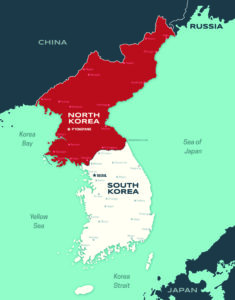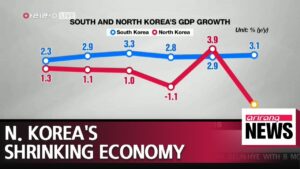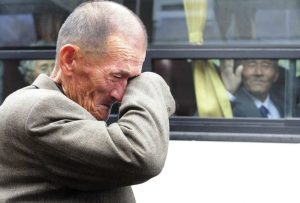 When the nations of North and South Korea were split, it was much like when Germany became East and West Germany…people were caught in the crossfire…so to speak. Despite being unified off and on for nearly 1,500 years, the Korean peninsula was divided into North and South as a result of the breakup of the Japanese empire at the end of World War II. The United States government knew that it would have to administer the Philippines, as well as Japan itself. It was a big job, so the United States was reluctant to also take trusteeship of Korea. Basically, Korea just wasn’t a very high priority for the United States. The Soviets, on the other hand, were more than willing to step in and take control of lands that the Tsar’s government had relinquished its claim to after the Russo-Japanese War (1904–05).
When the nations of North and South Korea were split, it was much like when Germany became East and West Germany…people were caught in the crossfire…so to speak. Despite being unified off and on for nearly 1,500 years, the Korean peninsula was divided into North and South as a result of the breakup of the Japanese empire at the end of World War II. The United States government knew that it would have to administer the Philippines, as well as Japan itself. It was a big job, so the United States was reluctant to also take trusteeship of Korea. Basically, Korea just wasn’t a very high priority for the United States. The Soviets, on the other hand, were more than willing to step in and take control of lands that the Tsar’s government had relinquished its claim to after the Russo-Japanese War (1904–05).
The Soviets wanted to set the country up as communist, and the United States wanted the country to be capitalist. The sad truth about the difference between communism and capitalism is that capitalism is about freedom, and communism is about slavery. The country was divided along the 38th parallel with a demilitarized zone along that line. The North Korean side of the 38th Parallel was ruled by communism, and the South was ruled by Capitalism. The economic impact was most unfortunate, in that two separate and “necessary to each other” industrial areas were now on  opposite sides. The two countries were now both poor.
opposite sides. The two countries were now both poor.
That was a sad state of affairs, but the worse state of affairs was what happened to the people. Communism being what is was, worried that if the people were allowed to cross the borders freely, they would not come back, and they were probably right. So the people who lived in North Korea and had family in South Korea were no separated from each other, and those in the south were equally separated from loved ones. It is a horrible situation, but there seemed to be no remedy for it. The separation went on for many years. Finally on October 31, 2010, the North Korean government relented to a degree. Four hundred and thirty-six South Koreans were allowed to spend three days in North Korea to meet their 97 North Korean relatives, whom they had been separated from since the 1950-1953 war. The three-day reunion was wonderful, but also bittersweet, because it was followed by a sad goodbye. The separation had been excruciating, and they had no recourse. They were at  the mercy of the ruling government. Nevertheless, they were also thankful for the time to spend together, even if it meant a tearful goodbye following a luncheon meeting during inter-Korean temporary family reunions at Mount Kumgang resort.
the mercy of the ruling government. Nevertheless, they were also thankful for the time to spend together, even if it meant a tearful goodbye following a luncheon meeting during inter-Korean temporary family reunions at Mount Kumgang resort.
When you look at the realities of Socialism, Marxism, and Communism, you cannot really be surprised by the many people who are trying to escape from it’s grip. Most are willing to give their life to get out in the hope of giving their children a better life than that. Many lessons could be learned from the situation between North and South Korea, if we will only pay attention.


Leave a Reply